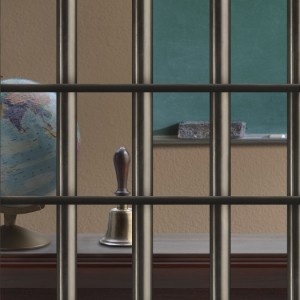 For some students at DePaul University, going to class involves more than just walking into into a lecture hall with a cup of coffee in one hand and a laptop in the other. There are background checks to be made, interviews to be conducted, and copious amounts of paperwork that must be completed before these students are able to even enter the classroom. Once there, they are required to remain in class until the session is over—no exceptions.
For some students at DePaul University, going to class involves more than just walking into into a lecture hall with a cup of coffee in one hand and a laptop in the other. There are background checks to be made, interviews to be conducted, and copious amounts of paperwork that must be completed before these students are able to even enter the classroom. Once there, they are required to remain in class until the session is over—no exceptions.
A response to some kind of on-campus disturbance? Is the lecturer a noted world leader needing to be protected from would-be assassins?
Not exactly.
The classes these students are attending aren’t taking place on the school’s Chicago campus. Rather, they are occurring about an hour away at the Stateville Correctional Center, a maximum security prison just outside of Joliet. And several of their classmates are residents of that facility.
The classes being taught at Stateville are part of the Inside-Out Prison Exchange Program, an effort started at Temple University in 1997 to bring college students and incarcerated men and women together to study as peers. By bringing prisoners and college students together, the hope is that preconceived ideas will be re-examined as both parties examine issues surrounding the criminal justice system, and that those outside the prison walls will be able to put faces to the issues the men and women living inside those walls face.
Three classes are currently being taught at Stateville: “Restorative Justice”; “Masculinity, Justice, and the Law”; and “Law and the Political System.” The program is available to any DePaul student, regardless of major, and to Stateville residents approved by the prison chaplain.
“When I’m sitting in that classroom, I sometimes forget that I’m sitting in a prison,” Griffin Hardy, a senior Catholic studies major tells The DePaulia, DePaul’s student newspaper. “[The prisoners are] like any other student. They’re there to learn, they’re there to discuss what they’ve read … They do all the same work that we as DePaul students do.”
“[The prisoners] sat on the edge of their seats, they were literally captivated by every word you said, and nothing gets past them,” says John Ziegler, the professor of the “Masculinity, Justice, and the Law” class. “They can read you, they can look right through you.”
The real lessons come as college students interact with their incarcerated colleagues. Once they are able to recognize themselves in each other, “that’s where the transformation begins,” says Ziegler.
Transformation is central to everything that Prison Fellowship does. Through in-prison outreach and programming, we seek to redeem those behind bars, preparing them for a new life in Christ. Through Justice Fellowship, we work to make the criminal justice system more just and more effective in the reduction of crime. Angel Tree works to restore families affected by crime and incarceration. And through the Second Prison Project, we work to eliminate the “second prison” that enslaves so many who have already served their time and want to become good citizens and good neighbors. To learn more about these programs, and how you might be able to help in your community, click here.